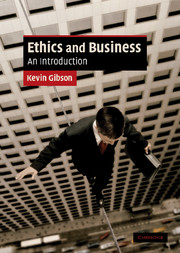
-
Select format
-
- Publisher:
- Cambridge University Press
- Publication date:
- 05 June 2012
- 19 July 2007
- ISBN:
- 9780511806148
- 9780521863797
- 9780521682459
- Dimensions:
- (247 x 174 mm)
- Weight & Pages:
- 0.708kg, 274 Pages
- Dimensions:
- (247 x 174 mm)
- Weight & Pages:
- 0.568kg, 274 Pages
You may already have access via personal or institutional login
Book description
In this lively undergraduate textbook, Kevin Gibson explores the relationship between ethics and the world of business, and how we can serve the interests of both. He builds a philosophical groundwork that can be applied to a wide range of issues in ethics and business, and shows readers how to assess dilemmas critically and work to resolve them on a principled basis. Using case studies drawn from around the world, he examines topics including stakeholder responsibilities, sustainability, corporate social responsibility, and women and business. Because business can no longer be isolated from its effects on communities and the environment, these concerns are brought to the forefront. The book also captures the dynamic nature of business ethics in the era of globalization where jobs can be outsourced, products are made of components from scores of countries and sweatshops often provide the cheap goods the public demands.
Reviews
"Last month we completed our first undergraduate business ethics course and thanks to your book it was a great success. Much discussion, good theoretical base for student case presentations, useful examples and easy to teach from."
--Professor Marjo Lips-Wiersma, University of Canterbury, New Zealand
"...The writing is clear and accessible. Gibson has chosen contemporary cases that students can relate to involving companies they have heard of — Nike, Wal-Mart, Enron, Shell — and issues they are no doubt engaged with — pornography, sweat shops, drug use, discrimination, and so on. As a result, any student who reads and works through Gibson’s book will get a solid introduction to many of the issues and concepts central to business ethics.... Gibson’s book is thoughtful, sensitive to many of the controversies among business-ethics theoreticians, and clearly the product of many years of reading and thinking through the world of business, ethics, and philosophy...."
--Stephen R. C. Hicks, Professor of Philosophy, Executive Director, The Center for Ethics and Entrepreneurship, Rockford College, Teaching Philosophy
Contents
Metrics
Altmetric attention score
Full text views
Full text views help Loading metrics...
Loading metrics...
* Views captured on Cambridge Core between #date#. This data will be updated every 24 hours.
Usage data cannot currently be displayed.
Accessibility standard: Unknown
Why this information is here
This section outlines the accessibility features of this content - including support for screen readers, full keyboard navigation and high-contrast display options. This may not be relevant for you.
Accessibility Information
Accessibility compliance for the PDF of this book is currently unknown and may be updated in the future.


